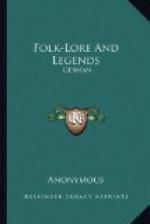Kenneth Oer had a son, who was called Ian Dubh Mac Coinnach (Black John, the son of Kenneth), and lived in the village of Miltoun, near Dingwall. His chief occupation was brewing whisky; and he was killed in a fray at Miltoun, early in the present century. His exit would not have formed the catastrophe of an epic poem, and appears to have been one of those events of which his father had no intelligence, for it happened in the following manner:—
Having fallen into a dispute with a man with whom he had previously been on friendly terms, they proceeded to blows; in the scuffle, the boy, the son of Ian’s adversary, observing the two combatants locked in a close and firm gripe of eager contention, and being doubtful of the event, ran into the house and brought out the iron pot-crook, with which he saluted the head of the unfortunate Ian so severely, that he not only relinquished his combat, but departed this life on the ensuing morning.
ELPHIN IRVING.
The fairies’ cupbearer.
“The lady kilted her kirtle
green
A little aboon
her knee,
The lady snooded her yellow hair
A little aboon
her bree,
And she’s gane to the good
greenwood
As fast as she
could hie.
And first she let the black steed
pass,
And syne she let
the brown,
And then she flew to the milk-white
steed,
And pulled the
rider down:
Syne out then sang the queen o’
the fairies,
Frae midst a bank
of broom,
She that has won him, young Tamlane,
Has gotten a gallant
groom.”
Old Ballad.




